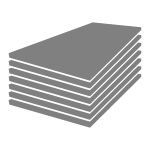Alloy 625 Grade 1 / UNS N06625 / W.NR. 2.4856
Description
Alloy 625 is a nickel-chromium-molybdenum alloy that is used for its high strength, high toughness and excellent corrosion resistance. The strength of alloy 625 is derived from the stiffening effect of molybdenum and niobium on its nickel-chromium matrix. Although the alloy was developed for high temperature strength, its highly alloyed composition also provides a significant level of general corrosion resistance.
Industries and Applications
Alloy 625 is used in a variety of industries, including automotive, marine, aerospace, oil and gas, chemical processing and nuclear. Typical end use applications include heat exchangers, bellows, expansion joints, exhaust systems, fasteners, quick connect fittings and many other applications requiring strength and resistance against aggressive corrosive environments.
Resistance to Corrosion
Alloy 625 has good resistance to oxidation and scaling at high temperatures. At 1800°F, scaling resistance becomes a significant factor in service. It is superior to many other high temperature alloys under cyclic heating and cooling conditions. The combination of the alloyed elements in alloy 625 enables it to withstand a wide variety of severe corrosive environments. There is almost no attack in mild environments, such as fresh and seawater, neutral pH environments, and alkaline media. The chromium content of this alloy results in superior resistance to oxidizing environments. The high molybdenum content makes alloy 625 very resistant to pitting and crevice corrosion.
Fabrication and Heat Treatment
Alloy 625 can be formed using various cold and hot working processes. Alloy 625 resists deformation at hot working temperatures, therefore higher loads are required to form the material. Hot forming should be performed within a temperature range of 1700° to 2150°F. During cold working, the material work hardens more rapidly than traditional austenitic stainless steels. Alloy 625 has three heat treatments: 1) solution annealing at 2000/2200°F and air quench or quicker, 2) annealing 1600/1900°F and air quenching or quicker and 3) stress relieving at 1100/1500°F and air quenching. Solution annealed (grade 2) material is commonly used for applications above 1500°F where resistance to creep is important. Soft-annealed material (grade 1) is commonly used for lower temperatures and has the optimum combination of tensile and rupture properties.
Common Trade Names
INCONEL® alloy 625
INCONEL® is a registered trademark of the Special Metals Corporation group of companies.











